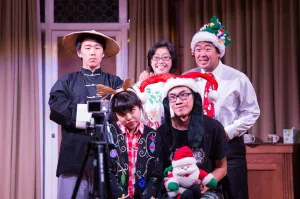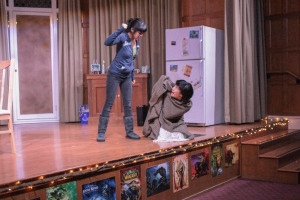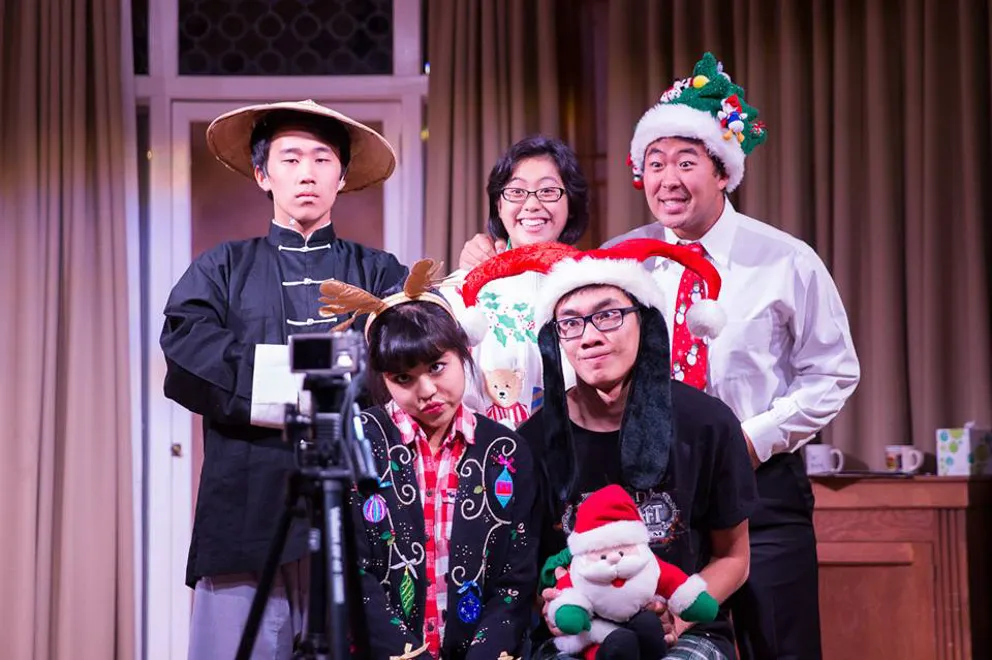
“Ching Chong Chinaman” — the title is shocking, invoking a pejorative term used towards Asians. The play is meant to be controversial, to make a statement. Directed by Saya Jenks ’16, the Asian American Theater Project’s (AATP) brave production of Lauren Yee’s play in Roble Dorm Theater this past weekend had many entertaining moments, but the production doesn’t quite make it clear what statement it wants to make or what story it wants to tell about race relations. The play relies on age-old racist jokes (a reminder to “open your eyes nice and wide!” for a Christmas picture) about multiple cultures without necessarily bringing in new information, perspectives or history. Still, AATP’s choice to present this play and follow some of the performances with post-show discussions successfully created a forum to discuss racial issues and how they’re presented onstage.
Entering the space, we see a realistic set with a thoughtful addition: chronological posters along the walls detailing the immigration of Chinese-Americans to the United States. The set design of Charlie Yang ’17 with charming holiday lights effectively creates the atmosphere of Christmas, a feeling that is supplemented by the festive song choices of sound designer Brigitte Wittmer ‘16.

The play follows the Wong family (an all-Asian cast depicting these third- and fourth-generation Chinese immigrants), as they each strive for their own kinds of happiness. The story rides from one outrageous one-liner to the next, with the through-line of ambitious-at-any-cost daughter Desdemona (Francesca Dawis ’17) searching for her heritage through her Princeton application. Her father Ed (Jin Park ’16) is a whitewashed, racist people-pleaser who throws money at problems to fix them, while his bored wife Grace (Rosemond Ho ’18) is focused on her desire to get pregnant. Their son Upton, a gamer who cares more about World of Warcraft than school, hires Jinqiang (Adi Chang ’18), also known as J or “Ching Chong,” as an indentured servant to help with his homework.
Chang, as J, delivers a nuanced and touching performance, supplemented by his skillful dancing (J’s dream is to become a famous dancer). Of the ensemble, he and Leena Yin ’17 – who shines as she plays multiple ensemble characters, from a doctor to Desdemona’s sponsored orphaned Korean child to a college interviewer – seem most comfortable onstage. Not surprisingly then, the scenes between them are the most emotionally authentic. The first time we hear J speak is on the phone with Yin — this time she’s playing his mother back in China. It’s truly affecting to hear his longing for his own American dream and to see her desires for his success intertwined with her worries about his situation.

It’s more difficult to connect with the other characters and their stories. While Desdemona’s struggle to get into college is familiar, her outbursts of rage seem to come from nowhere, and at the end, she has said and done so many unacceptable things that we don’t find ourselves happy for her when she’s accepted. When the family – minus a neglected Upton, who is at a gaming tournament in South Korea – goes to Mexico in search of its newly discovered heritage, the play takes an uncomfortable turn as it shifts to a satire of Mexican culture, reducing it to tequila, tacos and not much else. It’s unclear why we’re laughing about it or what the satire is aiming to achieve.
Ultimately, according to the director’s note, the play is “about a family searching for its identity.” The history on the posters on the walls is missing from Yee’s play. It’s wonderful to see an all-Asian cast, especially considering the fact that professional theaters still severely undercast Asian Americans, but it doesn’t help us understand the point of the satirical jokes any better. The relationships between characters seem to be partly formed around these punch-lines, and as a result, we’re left without much sympathy or understanding for the family (although Desdemona and Upton do share a touching moment at the end of the play).
AATP is “dedicated to the sharing and creation of work that addresses the Asian/Asian-American experience through theater and the performing arts.” This play certainly does address the Asian-American experience and showcases the talent of many Asian-American Stanford students. However, part of their mission is also to “address stereotypes and misrepresentations through nuanced portrayals of Asian/Asian-American cultures.” I’ve seen AATP do this very successfully, particularly with their thoughtful “My Fair Lady” last winter.
In “Ching Chong Chinaman,” the audience did laugh a lot. But the play lacked clarity about why; what was the purpose of the satire? The characters and cultures portrayed are more stereotypical than nuanced, and we don’t know to what end. AATP chose this play because Lauren Yee “tackles issues of racial stereotyping and cultural appropriation with … irreverent honesty,” but we leave without knowing how those issues have been tackled. Still, we wouldn’t be writing or speaking about how to portray racial issues – which still greatly affect our society – on stage without this brave presentation of a controversial play.
Contact Noemi at noemi11 ‘at’ stanford.edu.
